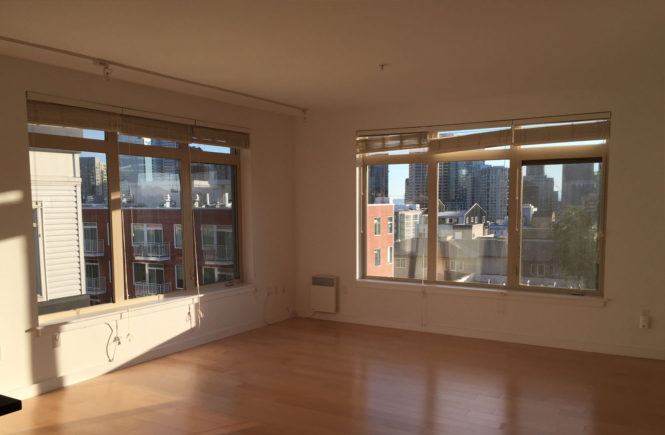I just bought my first condo and this is how I did it and my lessons learned.
My Background
I moved to Seattle a month after graduating undergrad in May 2012; at this point, my dad encouraged me to buy a place but I declined and replied I would only be in Seattle for one to two years. Alas, I was wrong and I ended up in Seattle for four years. In May 2016, I started real estate hunting. A month later, my offer on a 1-bedroom condo in Capitol Hill was accepted and I closed on my dream condo.
During my first three years in Seattle, my rent for a 500-700 sq ft studio in Lower Queen Anne was $1025/month and parking was $75/month (total was $1100/month). During my fourth year, my rent went up by $75/month to $1100/month while parking remained at $75/month (total became $1175/month).
Step 1: Research Your Ass Off
First off, research research research. Research everything and read all the first home buyer guides you can find. I spent several hours each day after work researching and then several hours on the weekends researching everything from interest rates to tax deductions to those “Top Ten Mistakes New Homebuyers Make” articles like this one. Do it in a fancy cafe so you feel great! 🙂 Interest Rates: For every 1% increase in interest rate, your buying power decreases 10%.
Step 2: Get A Strong Credit Score
Most of these home buying guides start you off right – you need to have a strong credit score to take out a mortgage loan. If you don’t have a strong credit score (above 740+), you probably won’t get a great interest rate whether it’s a fixed or adjustable one. The better your credit score, the better interest rate you’ll be able to secure (to an extent). I understand you can’t just suddenly build a strong credit score but start now and maybe it will kick in for your second home. If you’re buying with all cash and not taking out a mortgage, maybe your credit score matters less. Baller!
Step 3. Get A Pre-Approval Letter From A Strong Lender
Having a pre-approval letter attached with your offer means that you’re a serious buyer and it makes you a stronger contender to secure that winning bid. You should get the letter BEFORE you start house hunting because the sooner you get the letter, the sooner you’ll be able to know your limits (in other words, how high you can bid).
To get a pre-approval letter, you’ll need to know 1. how much the home you want costs and 2. how much of that amount you’re looking to borrow. They will ask for all your wage, income, and financial statements and their recent and current balance. For example, I wanted a home that was $300k-$500k and I wanted to borrow $240k – $400k respectively, so my pre-approval letter was for a home up to $500k where I could borrow up to $400k from a lender. The pre-approval letter IS NOT the amount or rate or lender that you ultimately have to use – consider it just a nice letter of rec from a lender with no strings attached.
You should be getting your pre-approval letter from a STRONG lender, not just any lender. A good lender makes your offer stronger. In Seattle, Caliber Home Loans is often a well-recognized name that selling agents respect and prefer you use. My realtor told me she had clients that got their offers rejected because they had a poor lender (e.g. Bank of America); some selling agents complain that Bank of America has a slow response time, are untimely with documents, and etc. Everyone, especially sellers, want to have smooth, quick sailing after the offer is accepted so having a preferred lender makes your offer stronger. Quick and easy is the reason why many seller end up going with all-cash offers. Most of the time, condos will have a section on their website that lists preferred lenders. You can use that if you want. I just asked my friend what she used and I used what she used. Typically, pre-approval letters last anywhere from 3-6 months so you have 3-6 months to find your home! If you don’t find it within 3-6 months, that’s okay too.
If you are in Seattle and need a strong lender, use Rodney Coulombe at Caliber Home Loans; let him know that JoYo sent you! He was my lender that I got my pre-approval letter from and ultimately my lender when I closed on my condo. He was incredibly reliable, helpful, nice, and impeccably professional. His attentiveness and his ability to be prompt and thorough in answering questions was crucial to my smooth closing.
Step 4. Consider Shopping Around for Interest Rates
Your first pre-approval letter will provide estimated interest rates for the amount you’re potentially taking out. They may or may not be the best ones out there. It’s up to YOU to research the best rates and the different scenarios that come with low interest rates (points, fees, etc. may be the cause of lower rates). Lower rates come at a price and talk to your lender about it. Whenever a lender handles your file, they will do a HARD credit pull and your credit score does move down a tiny bit. Then, in the next 30-day window, if anybody else does a hard credit pull, it will NOT lower your credit score. Your credit score won’t constantly go down if you have a month where you’re getting interest rate quotes from several lenders. I personally didn’t use any lender except one. I did do online research to make sure my rates were competitive though.
Step 5. Really Think About What You Want and Why
You need to ask yourself what you want, why you want it, and what time frame you are working with.
- Are you going for an investment property?
- Do you want to live in it?
- What is the short-term and long-term plan for this property?
- Do you want to eventually sell it?
- What’s the financial motivation for purchasing this place?
- Does it make sense to buy or keep renting?
- How will the rental market change over the time period?
- How will my home value change over the time period?
- Are you planning on being a landlord?
- Is there a rental cap on the condo association (which means only X% of the building occupancy can be non-owners)?
- Do you plan on managing the property yourself or hiring someone else to manage the property?
- What are the property management fees?
- Who will rent from you?
- How much will they pay?
- What are the alternatives that they can live in and pay?
- Is the rent I want to charge competitive?
- How is the rental market going in that neighborhood?
- Is there a lot of vacancies and will there will enough demand for your unit?
- Check Craigslist and rental properties and see what the going rental rates are. Compare your 1-bedroom with a 1-bedroom of same year and size and the rent of that.
- Is the condo in a nice, convenient area?
- What amount of rent will I need to charge in order to break-even or make money off this condo?
- Is rent going to be higher than the mortgage or will I need to eat some of the cost?
These questions will shape what type of real estate you should be buying and what questions you should be asking before making an offer. If you are buying an investment property that you aren’t living in, think about how you will rent it out. If you are buying a place that you want to live in and keep forever, think about if you’re going to live in it for the rest of your life or just own it for the rest of your life.
Did you know if you buy a property and then stay in it for at least two of the most recent five years before you sell it, you can write-off $250,000 in capital gains taxes? That 2-year stay doesn’t need to be consecutive. If you fulfill the two years, you don’t get taxed on the capital gains you make when you sell the home for more than you bought it – up to $250,000 for a single owner and twice if you’re married! You are getting away tax-free! #Dreams
Step 6. Get Addicted to ALL the Real Estate Sites
Stalk the top real estate listing sites. I ended up using Redfin the most and they assigned me my realtor. I used:
- Redfin: Sign up for their alerts and use their saved searches. It offers real estate, homes for sale, MLS listings, and agents. Search all real estate listings, tour homes, and make offers with the help of local Redfin real estate agents.
- Trulia: Offers real estate listings, homes for sale, and housing data. Good destination for all real estate listings and rental properties and provides comprehensive school and neighborhood information on homes for sale.
- Zillow: Offers real estate, apartments, mortgages & home values. Search for for-sale and rental listings, compare Zestimate® home values, and connect with local professionals.
- Findwell: Offers Seattle real estate agents and search Seattle homes for sale. Find a great Seattle real estate agent and search Seattle homes for sale.
Step 7. Talk to Everyone Who Bought Real Estate
Interview and talk to as many people with properties as possible. The people who bought in a similar area or are in a similar situation as you, the more helpful their information will be to you. Interview them, take them out to coffee, or have dinner with them. Find people who are like you that just finished the process. Look for recent homeowners that are your age range, bought your area, and had your price range. Ask them about lessons learned, mine for information, and pick their brains like a vulture. Also, gather advice from veterans who have strong experience in multiple real estate purchases.
Step 8. Research What A Great Realtor Does and Find One
A realtor agent is like your tour guide to house hunting. They should be there for you whenever you need it, they should schedule all your open houses and viewings, and they should take you to the listings and tell you their unique insight on pricing, location, and the place itself. My realtor was great and she pointed out good points and bad points of a listing that I didn’t know about. The kitchen of the condo I ultimately bought has counter-to-ceiling tiling which she says is unique and of high value as most kitchen tilings end at eye level. She also pointed out all the new appliances and remodeling work that was done. She went above and beyond in gathering more information than what was listed online and on the flyer, calling the selling agent and asking the seller key questions. She’s fantastic and if you want to use her, her account is here (Hilary Kelly). Make sure you tell her that JoYo sent you!
Also, Redfin assigned me my realtor and I ended up closing my condo with my Redfin realtor so I received $500 back from Redfin after my condo closed. Read about how fees work when purchasing real estate here. Basically the seller pays all the fees. They pay 3% of the selling price to their realtor (selling agent) and then they pay 3% of the selling price to your realtor (buying/purchasing agent). There are some realtor estate agents that split 50/50 with you so the realtor gets 1.5% and the realtor agrees to share 1.5% with you. Being a real estate agent is extremely competitive and some realtors do fee sharing to incentivize customers to use them.
Step 9. Go House Hunting and See As Much As You Can
To really get a feel for the market where you understand the selection available and the different pricing of the homes, you need to see as many places as you can. Just go and see places you are pretty interested in – don’t waste time on places that don’t check all the requirement boxes. The more you see, the more you’ll start to develop a taste and an idea of what exactly you’re looking for. Your realtor should be going to open houses with you and they should be scheduling viewings for you. Then, they should be giving you insights that you can’t see. Having lived in Seattle for four years and been to my fair share of house parties and knowing the rental market like the back of my hand, I knew exactly what I was looking for. The factors I examined were:
- Age – When it was built?
- Size – How many square foot?
- # of Bed & Bath – How many bedrooms and bathrooms are there?
- Appliances – What kind of appliances does it have and what condition are they in? (e.g. washer and dryer in-unit?)
- Quality of Home – What condition it is in?
- Parking – Does it include parking? How many spots? Is it covered or uncovered parking?
- Amenities – Is there a gym in the complex? Is there a rooftop with BBQ grills? Is there a community room or rental space?
- Homeowners Association Dues (HOA) – What do the home owner association cover?
- Location & Surroundings – Where is it? What neighborhood is it in? Is it a safe neighborhood? What’s the crime rate and crime map of the area (Seattle crime maps here)? Is it near a freeway? Is it near a park? Is it near a grocery store or multiple? What kind of upcoming developments are coming nearby?
- Convenience & Distance – How close is public transportation? What options for transportation are there? How far away from key locations like work and groceries and friends?
- Comparables – How does the home’s price compare with similar homes?
Step 10. Think About How to Liquidate For Earnest Money and Down Payment
Understand the liquidity of all your assets and where you’ll be taking the down payment. The faster you have your down payment in a single account ready for a wire transfer, the better. You don’t want to scramble. Fees. Wire transfer fees. Think about the loan you’re taking on. Consider the amount of principal and tax you’re going to pay.
Step 11. Make an Offer
Your realtor should be there to guide you to write your offer and do the best to get accepted. You may or may not need to write a personal letter with your offer. It makes a difference. I didn’t need to write a letter. A lot of people write letters and it makes a difference when the market is competitive. Some sellers aren’t looking for all cash.
Step 12. After Offer is Accepted, Liquidate Your Assets
Once your offer is accepted, you will need to immediately put down the earnest money in escrow (I think you just get a couple days to pool up the earnest money). To avoid fees with wire transfers, last-minute cashier’s checks, and other bank rules, make sure you have a liquidation plan set for the expected earnest money. It’s usually 2-5% of the home price or a flat $5-$10k.
Step 13. Hire an Inspector and Have An Inspection
If you waived your inspection, you should still hire an inspector. The inspector will write a report of everything that’s wrong and messed up at your place that you as a layman couldn’t see. A professional will be able to tell you the hidden issues with your place. Then, some mandatory fixes will be done by the seller to make sure they’re selling a fit home. I picked my inspector off Redfin (his reviews here); his name was Paul Ryan and he was super fantastic (his website here). Read about inspections here: https://www.redfin.com/home-buying-guide/home-inspection.
Step 14. Reading, Signing, Signing, Signing, Reading, and More Signing
Before your closing date comes, you will need to read some contracts and documents and then (electronic) sign a bunch of documents with your loan officer and realtor.
Step 15. Schedule and Attend a Closing Date and Appointment
Your closing date is here and you read and sign a bunch of contracts at the title/escrow office.
Step 16. You Get Your Keys!
My realtor dropped off my keys to me.
RESOURCES
General Real Estate Topics and Resources
- Home Value Appreciation Calculator
- Mortgage Calculator
- Seattle Appreciation Rates And Housing Market Information
- Seattle Home Prices & Values
- Tax Topic 701 – Sale of Your Home
- The $250,000/$500,000 Home Sale Tax Exclusion
- Capital Gains And Your Home Sale
Seattle-specific Real Estate Resources
- Seattle Condo Market: Good source of Seattle condo listings, news, and info
- Seattle Condo Blog: Great blog
- Upcoming Buildings and Developments: Design reviews and applications
- Seattle Apartments for Rent: Rental comparables
- Cost of Living in Each City: Seattle vs SF real estate or other cities
![]()




